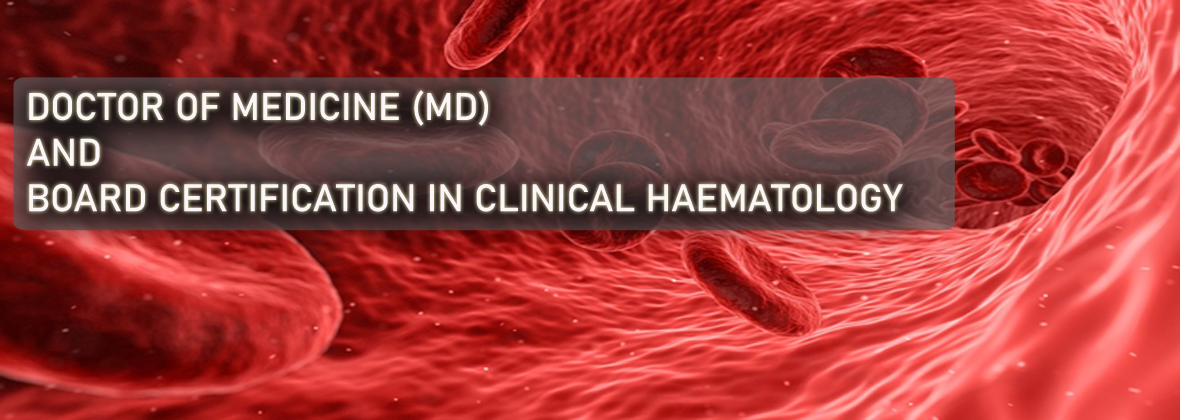
![]()
The training programme of the MD in Clinical Haematology consists of 2 years of full-time clinical training in several different fields of medicine. The rotations include general medicine, haematological oncology (both adult and paediatric), paediatrics, medical intensive care, cardiology, obstetrics and gynaecology, thalassemia, bone marrow transplantation, and radiology in units approved by the Board of Study.
![]()
At the end of the training programme, trainees who are successful at the postgraduate MD in Clinical Haematology examination should have reached a level of competency to function as a consultant/specialist in clinical Haematology.
- Learning Objectives of the MD in Clinical Haematology
At the end of the training of the post graduate MD in Clinical Haematology, trainees should be able to
- Describe the pathogenesis of haematological disorders.
- Investigate, diagnose, treat and prevent disorders of the haemopoietic and lymphatic systems with primary haematological diseases of both adult and paediatric patients.
- Investigate, diagnose, treat and prevent disorders of the haemopoietic and lymphatic systems in patients with disorders due to consequence of diseases in other systems in both adult and paediatric patients.
- Investigate diagnose, treat and prevent disorders of coagulation and thrombosis in adults and children.
- Investigate, diagnose, treat and prevent disorders due to transfusions ∙ Manage transfusion dependent patients, both paediatrics and adult. ∙ Manage critically ill patients with multi system problems.
- Work closely with many professionals as a team in managing critically ill patients. E.g. laboratory technical staff, nursing staff, pharmacists, physiotherapists, dieticians, and other professionals allied to medicine.
- Provide optimum care for critically ill Haematology patients with close liaison with medical specialists of fields such as microbiology, pathology, palliative care, renal medicine, ophthalmology, obstetrics, orthopedic surgery and intensive care.
- Manage Haematology laboratories
- Teach and work as a team worker and leader
- Be able to discuss clinical governance and audit
- Be able to discuss the importance of research in improving clinical practice ∙ Be able to discuss the importance of continuous medical education activities and partake in such activities
![]()
In order to be eligible to enter the MD in Clinical Haematology training programme, trainees should have passed the Postgraduate Diploma in Clinical Haematology examination. The number to be enrolled will be indicated by a circular issued by the PGIM. Entry to the MD programme will be on merit order of the Postgraduate Diploma in Clinical Haematology examination.
Please refer to the relevant prospectus for the most up to date information. The prospectus of a particular programme contains official information pertaining to a programme approved by the Board of Management, University Senate and the University Grants Commission